

What makes math instruction in China more effective? By Jennifer Johnston | Posted on Wednesday, Oct. 23, 2013 — 10:07 AM (iStock) A $200,000 grant from the National Science Foundation will enable a team of U.S. and Chinese researchers to identify instructional supports that lead to higher levels of mathematics achievement.
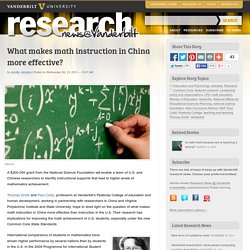
Thomas Smith and Paul Cobb, professors at Vanderbilt’s Peabody College of education and human development, working in partnership with researchers in China and Virginia Polytechnic Institute and State University, hope to shed light on the question of what makes math instruction in China more effective than instruction in the U.S. Their research has implications for improving the math achievement of U.S. students, especially under the new Common Core State Standards. Thomas Smith (Vanderbilt) What makes math instruction in China more effective? British plan to emulate Shanghai pupils' maths excellence doesn't add up. Educators in Shanghai have reason to cheer after Britain decided to import 60 local maths teachers to train their British counterparts.
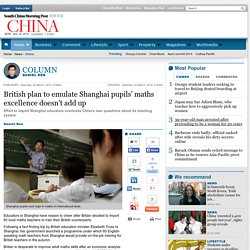
Following a fact-finding trip by British education minister Elizabeth Truss to Shanghai, her government launched a programme under which 60 English-speaking math teachers from Shanghai would provide on-the-job training for British teachers in the autumn. Britain is desperate to improve adult maths skills after an economic analysis found poor numeracy was costing the country £20 billion (HK$257 billion) a year. Mathematics: made to measure. Mastery in mathematics: What it is and why we should be doing it. Thoughts on topical issues of mathematics education from the NCETM’s Director, Charlie Stripp Approaches to differentiation; defining a ‘mastery’ approach; the ‘England-China Mathematics Education Innovation Research Project’ I’ll be controversial: I think it may well be the case that one of the most common ways we use differentiation in primary school mathematics, which is intended to help challenge the ‘more able’ pupils and to help the ‘weaker’ pupils to grasp the basics, has had, and continues to have, a very negative effect on the mathematical attainment of our children at primary school and throughout their education, and that this is one of the root causes of our low position in international comparisons of achievement in mathematics education.

If my suspicion about the damage caused by current practice in differentiation in many maths lessons is correct, we should do something about it. Www.bsrlm.org.uk/IPs/ip26-3/BSRLM-IP-26-3-5.pdf. Robert Gagne’s Five Categories of Learning Outcomes and the Nine Events of Instruction. Robert Gagné’s seminal work is his conditions of learning theory.
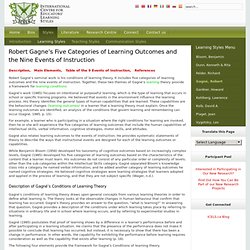
It includes five categories of learning outcomes and the nine events of instruction. Together, these two themes of Gagné’s learning Gagné (1985) defines learning as a change in human disposition or capability that persists over a time period and is not simply ascribable to processes of growth. This change occurs as a behavioural change, and the inference of learning is made by comparing behaviours that occur both before and after a learner participates in a learning situation (p. 2). theory provide a framework for learning conditions. Gagné (1985) describes the internal and external conditions that in a learning situation. Kolb's Learning Styles and Experiential Learning Cycle. By Saul McLeod published 2010, updated 2013 David Kolb published his learning styles model in 1984 from which he developed his learning style inventory.
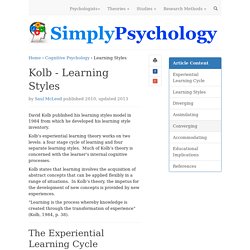
Cockcroft Report 1982 - full text. Report of the Committee of Inquiry into the Teaching of Mathematics in Schools under the Chairmanship of Dr WH Cockcroft London: Her Majesty's Stationery Office 1982© Crown copyright material is reproduced with the permission of the Controller of HMSO and the Queen's Printer for Scotland.
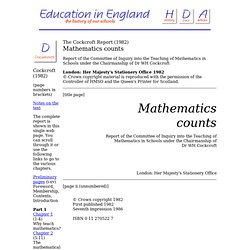
Report of the Committee of Inquiry into the Teaching of Mathematics in Schools under the Chairmanship of Dr WH Cockcroft [page iii] Foreword Few subjects in the school curriculum are as important to the future of the nation as mathematics; and few have been the subject of more comment and criticism in recent years. The main message is for the education service. The Committee's terms of reference invited it to consider the teaching of mathematics with particular regard to the mathematics required in further and higher education, employment and adult life generally. This is a first-class report. January 1982 [page v] [page vi] 10 November 1981 Dear Secretaries of State Yours sincerely [page vii] Contents [page ix] Learning styles - magazine article.
Comment:4 average rating | Comments (3)Last Updated:26 January, 2014Section:magazine article Your weekly guide to a whole-school issue The concept of learning styles has become a cornerstone of good practice.

It's endorsed by the Government, reinforced by local authorities and taught at teacher training centres across the country. Every newly qualified teacher enters the classroom trained to tell a visual learner from an auditory one. But the backlash has started, with academics claiming that many of the resources on the market are unproven; at best a waste of time and money, at worst a potential stumbling block to children's progress. Keeping it simple. Research Gateway. Www.bsrlm.org.uk/IPs/ip26-3/BSRLM-IP-26-3-5.pdf. Singapore Maths Method - TES Mathematics - Forum - TES Mathematics. Bruner - Learning Theory in Education. By Saul McLeod published 2008,updated The outcome of cognitive development is thinking.
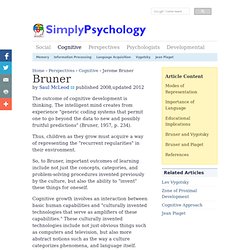
The intelligent mind creates from experience "generic coding systems that permit one to go beyond the data to new and possibly fruitful predictions" (Bruner, 1957, p. 234). Thus, children as they grow must acquire a way of representing the "recurrent regularities" in their environment. So, to Bruner, important outcomes of learning include not just the concepts, categories, and problem-solving procedures invented previously by the culture, but also the ability to "invent" these things for oneself. Cognitive growth involves an interaction between basic human capabilities and "culturally invented technologies that serve as amplifiers of these capabilities.
" Www.uk.sagepub.com/haylock/Making Connections.pdf. Www.merga.net.au/documents/Ho_&_Lowrie_2012_MERGA_35.pdf.